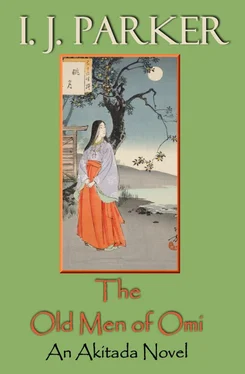I. Parker - The Old Men of Omi
Здесь есть возможность читать онлайн «I. Parker - The Old Men of Omi» весь текст электронной книги совершенно бесплатно (целиком полную версию без сокращений). В некоторых случаях можно слушать аудио, скачать через торрент в формате fb2 и присутствует краткое содержание. Год выпуска: 2015, Жанр: Исторический детектив, на английском языке. Описание произведения, (предисловие) а так же отзывы посетителей доступны на портале библиотеки ЛибКат.
- Название:The Old Men of Omi
- Автор:
- Жанр:
- Год:2015
- ISBN:нет данных
- Рейтинг книги:4 / 5. Голосов: 1
-
Избранное:Добавить в избранное
- Отзывы:
-
Ваша оценка:
- 80
- 1
- 2
- 3
- 4
- 5
The Old Men of Omi: краткое содержание, описание и аннотация
Предлагаем к чтению аннотацию, описание, краткое содержание или предисловие (зависит от того, что написал сам автор книги «The Old Men of Omi»). Если вы не нашли необходимую информацию о книге — напишите в комментариях, мы постараемся отыскать её.
The Old Men of Omi — читать онлайн бесплатно полную книгу (весь текст) целиком
Ниже представлен текст книги, разбитый по страницам. Система сохранения места последней прочитанной страницы, позволяет с удобством читать онлайн бесплатно книгу «The Old Men of Omi», без необходимости каждый раз заново искать на чём Вы остановились. Поставьте закладку, и сможете в любой момент перейти на страницу, на которой закончили чтение.
Интервал:
Закладка:
He was not trained in fighting with a naginata , but guessed it was not so different from the heavy oak staffs used in stick fighting and he was very good at that. Swinging the weapon out in a wide arc he then reversed into the opposite direction while running at the two remaining sohei who were coming for him with their swords. He saw their eyes widen in shock, saw that one was Kojo, saw him jumping aside, and the other raising his sword to deflect the halberd’s blade. But Tora’s force was too great. The sword went flying, and Tora slashed his belly. The man fell, clutching himself.
Turning on his heel, Tora saw Kojo running out of the shelter and followed. A violent fury had seized him at what they had done to the wood gatherers, and this red-hot energy had not left him throughout the battle. He seemed to fly across the rough ground, down the rutted mountain road after the fleeing figure.
He caught up with Kojo where the road made the turn and roared, “Coward! Stop and fight like a man!”
The other, not having much choice in the matter, did stop soon after. Kojo still had his sword and the courage of despair.
Kojo! The one he had wanted to kill with his own hands.
Too late Tora realized that the sohei had stopped among trees and shrubs. The naginata was of little use here because he could not slash with it. This battle would have to be fought close up, and Tora no longer had his sword.
Mere details, he decided in his fury.
Holding the naginata straight in front of himself, he charged. Kojo jumped aside and laughed. But he was now at the very edge of a ditch. Hoping that he did not realize this, Tora changed his grip and charged again. This time Kojo slashed at the naginata with his sword and severed the wooden shaft. He laughed again, stepped back, and fell.
Tora was on him instantly. Using the splintered end of the naginata shaft on Kojo’s neck to pin him down, he watched the sohei choke out a gurgling scream and drop his sword to claw at his neck. Tora snatched up the sword and hacked off Kojo’s head.
Then he took a couple of steps and his knees buckled. He collapsed, and sat on the ground, hunched over, breathing heavily, and waiting for the pain. There must be pain. He felt sure he had been wounded though he did not know where or how badly.
The pain came, but it was in his head. It pounded viciously so that he held on to his head for fear it would come apart.
When the throbbing eased a little, he recalled Saburo. He had last seen him stretched out lifeless in the wood shed. He was either dead of badly wounded. And Tora had left him there with at least one sohei still alive.
He staggered to his feet. Carrying Kojo’s bloody sword he headed back.
All was quiet around the hut and shed. Tora heaved a sigh. How would he explain Saburo’s death? What could he say to his mother, unlikable though the woman was? What would his master say? He had been disobedient once too often. Perhaps he, Hanae, and Yuki would become homeless and masterless.
He cast a glance around in case one of the sohei was lurking. Seeing nobody, he went to the shed.
The smell of blood was strong. Saburo’s body was gone, but four others lay about. The ground was wet and slick with blood. Tora checked them. All sohei and all dead. Two had died from the wounds he had dealt them, but the other two had been merely disabled. Now they had their throats cut.
He looked around, half hoping. If Saburo had killed them, then he might not be too badly hurt.
“Saburo?”
An answering shout came from the hut. He walked across. The door stood open. Clutching the sword, Tora looked in.
Saburo sat on the floor. Beside him knelt the wood gatherer’s wife, her face bloody and bruised, but her hands busy bandaging Saburo’s left thigh. The bandage was leaking blood, and Tora guessed that he had been slashed badly.
“How is it, brother?” he asked.
“It will do. Did you get that bastard Kojo?”
“Yes.”
Tora’s strength gave way again, and he flopped down.
“Are you wounded?” Saburo asked anxiously.
“I don’t think so. Just very tired. And my head hurts.”
“Sorry, brother.”
“It’s nothing.” He looked at the young woman. “I’m very sorry,” he told her. “We saw, but we were too far away. Are you all right?”
She looked back at him with dull eyes. “No,” she said. “But it was my karma. ” She glanced over to a corner of the room. Tora saw that she or Saburo had put her child there. The boy was much too still. “He was a very good boy,” she said. “He always did what we told him.” She bowed her head, then looked back up at Tora. “Why?” she asked him. “Why did they kill such a good little boy?”
Tora sighed. “I don’t know, love,” he said heavily. “I don’t know why terrible things happen. I’m very sorry we couldn’t stop them.”
“Not your fault,” she said listlessly and finished tying Saburo’s bandage.
“What will you do?” Saburo asked.
“Go home and ask my neighbors to help me bring my husband home. I’ll carry Kaoru myself.”
“You’re not hurt?” Tora asked.
“I’m strong,” she said and go to her feet.
Tora said, “We have horses, back in the woods.” It was a long way and uphill, but he would have to go and get them. Saburo could not walk.
“No. I want to go alone.” She lifted her dead child to cradle him in her arms and kiss his bloody face.
Tora started to his feet, but Saburo said quietly, “Let her go. She needs her grief.”
Chapter Twenty-Eight
Akitada reached his bed long after Kosehira’s household had retired. A sleepy porter had admitted him and taken his horse. Akitada was thankful that the sure-footed beast had known its way home on its own. His bedding had been laid out by Kosehira’s servants, and he flung his robe over the clothing stand, pulled off his boots, and fell asleep as soon as he lay down.
The next morning promised another sunny day. Akitada woke late, avoided the garden, washed, dressed, and ate the gruel provided by another servant, then headed for the stables. Kosehira joined him shortly and they rode to work together.
“I’m almost finished with the temple investigation,” Akitada said casually on the way.
“Ah. What will you do next?”
Here it was. Akitada smiled at his friend. “I must return to my duties in the capital.”
This clearly distressed Kosehira, who said nothing for a moment.
“You have been a kind, generous, and patient host. I shall always remember this visit fondly,” Akitada added.
He would always remember it for quite different reasons; for that matter, he had used almost the same words to bid her goodbye.
Kosehira said, “I’m sorry.” His tone was almost funereal. He added for good measure, “Sorrier than you’ll ever know.”
Akitada could not let this pass. “Why? I shall not be far away, and we shall meet again in the capital. I hope you come often.”
Kosehira looked into the distance, a distance that consisted of the great lake, shimmering in the sun and surrounded by green mountains. “It’s just … I had hoped …” He paused, then asked, “But what about the Great Shrine Festival? You were going to stay for that and have your children join us.”
Ashamed, Akitada muttered something about not having reckoned on finishing quite so early and not having permission to stay away from the ministry. It sounded lame, but Kosehira did not argue.
At the tribunal, they went their separate ways, and Akitada returned to the archives to discuss his report with the others.
Читать дальшеИнтервал:
Закладка:
Похожие книги на «The Old Men of Omi»
Представляем Вашему вниманию похожие книги на «The Old Men of Omi» списком для выбора. Мы отобрали схожую по названию и смыслу литературу в надежде предоставить читателям больше вариантов отыскать новые, интересные, ещё непрочитанные произведения.
Обсуждение, отзывы о книге «The Old Men of Omi» и просто собственные мнения читателей. Оставьте ваши комментарии, напишите, что Вы думаете о произведении, его смысле или главных героях. Укажите что конкретно понравилось, а что нет, и почему Вы так считаете.












